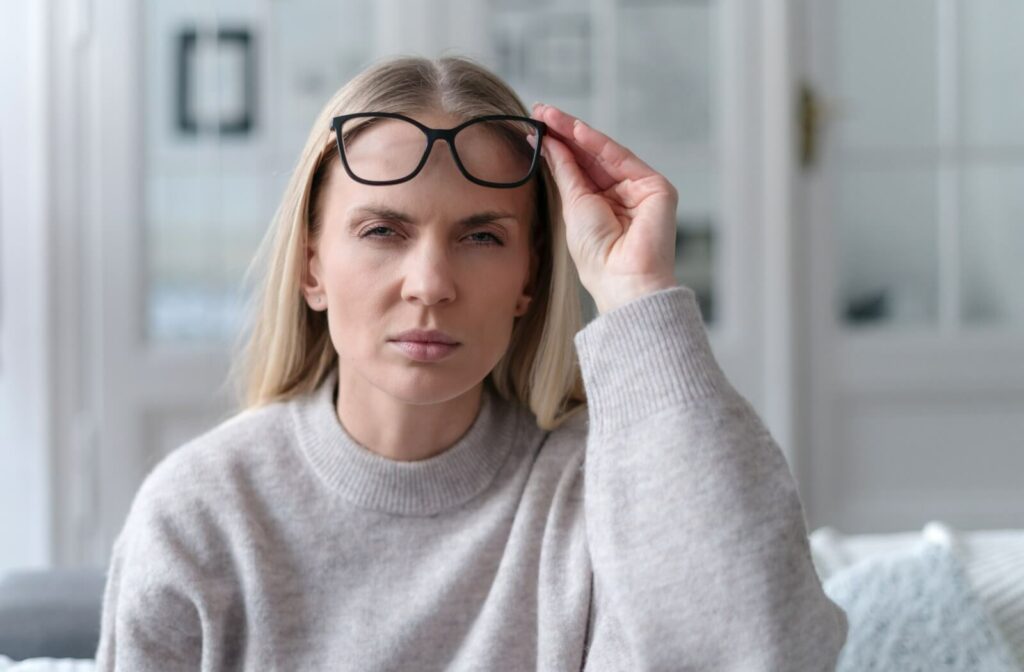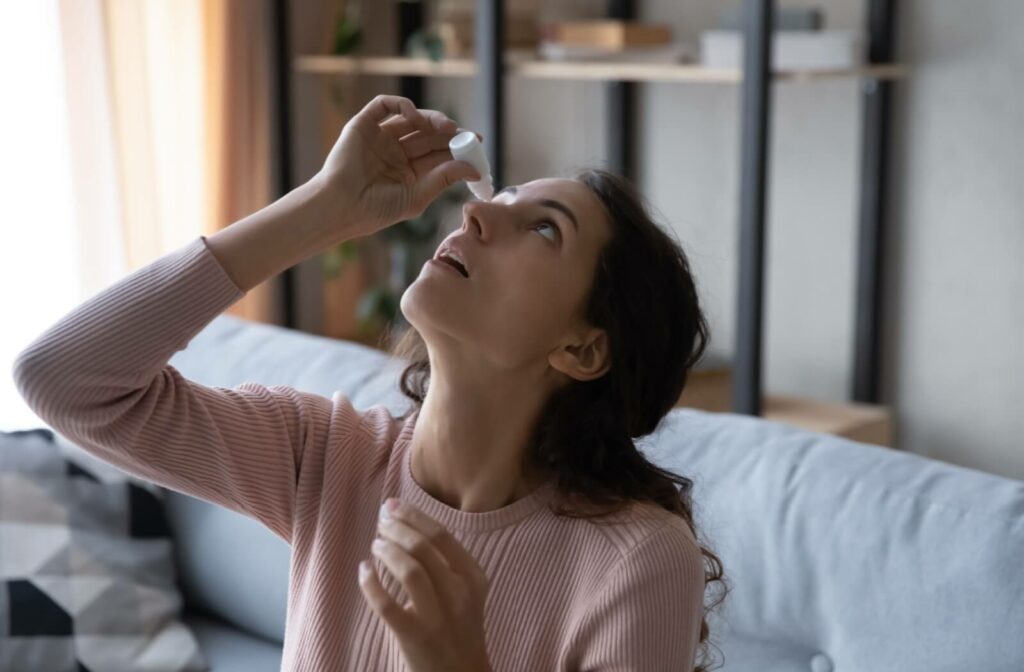Dry eyes are more than just an inconvenience—they can lead to significant discomfort and even visual disturbances like blurred vision. You’re not alone if you’ve ever struggled with dry, irritated eyes that make your sight feel hazy or unfocused, even with glasses or contact lenses.
Blurred vision often occurs because dry eyes disrupt the tear film your eyes need to maintain a clean, clear surface.
What Causes Dry Eyes?
Dry eye develops when your eyes don’t produce enough tears or lack the proper balance for lubrication and health. Tears are essential for maintaining a moist, comfortable, and nourished eye surface, which is crucial for clear vision.
Dry eye is often caused by multiple factors. However, common causes include meibomian gland dysfunction, blepharitis, environmental conditions, certain medications, and specific lifestyle factors.
Meibomian Gland Dysfunction (MGD)
The meibomian glands in your eyelids produce the oil layer of your tear film. When these glands are blocked or not functioning properly, your tears lack the oil that helps moisture last longer and spread evenly across the eye. As a result, your tears evaporate too quickly, leading to dryness.
Blepharitis
Blepharitis is an inflammation of the eyelids, often caused by bacteria or skin conditions. The eyelids become red and irritated, with dandruff-like scales forming on the eyelashes, blocking the oil glands and reducing the quality of your tears.
Environmental Factors
Several environmental factors can worsen dry eye symptoms. Windy days, low humidity, smoky conditions, and even air conditioning can increase tear evaporation, making your eyes feel drier.
Lifestyle & Medical Conditions
Long hours of staring at a screen, wearing contact lenses, or experiencing side effects from medications like antihistamines and antidepressants can all worsen dryness.
Additionally, hormonal changes and certain conditions, including diabetes and rheumatoid arthritis, may contribute to tear dysfunction.
What Causes Blurry Vision?
Blurred vision can result from various issues. However, when it comes to dry eye, the explanation usually relates to how tears impact your ability to see clearly.
When your eyes are adequately moisturized, the tear film creates a smooth surface over the cornea, allowing light to refract correctly into your eye.
When the tear film is disrupted or unstable, your cornea becomes uneven, scattering light instead of properly focusing, resulting in blurry or distorted vision.
Other causes of blurred vision unrelated to dry eyes may include:
- Refractive errors like myopia, hyperopia, astigmatism, & presbyopia
- Digital eye strain due to prolonged screen time
- Cataracts that cloud the natural lens of your eye
- Eye diseases like macular degeneration or diabetic retinopathy
- Eye allergies or infections like conjunctivitis (pink eye)
However, when dryness and blurriness occur simultaneously, your tear film instability is likely to be the cause.
How Dry Eyes & Blurry Vision Are Linked
When you have dry eyes, blurry vision can occur due to a combination of factors.
Tear Film Instability
Your tear film is made up of 3 main layers:
- Oil layer to prevent evaporation
- Water layer for hydration
- Mucus layer so tears stick to the surface
All 3 layers are essential for maintaining a healthy balance. When any part of the tear film is insufficient or imbalanced, it can disrupt the corneal surface, leading to blurred vision.
Inflammation
Inflammation of the eye’s surface or tear-producing glands can alter how tears are produced and distributed, affecting lubrication and visual clarity.
A Potential Cycle
Dry eye can lead to behaviors like rubbing your eyes or overusing artificial tears, which further exacerbates irritation and the deterioration of the tear film, creating a cycle that worsens both conditions.

Treating Dry Eyes & Blurry Vision
Dealing with dry eye and blurry vision involves addressing the root cause and managing symptoms. Fortunately, several options are available to relieve dryness and improve blurred vision.
Over-the-Counter Solutions
Mild and chronic dry eye symptoms can be alleviated with several at-home strategies, including:
- Using artificial tears to help restore moisture; opt for preservative-free options to reduce irritation
- Applying warm compresses, such as a moist, clean cloth, over the eyes to help stimulate oil flow from your meibomian glands
- Maintaining lid hygiene by cleaning daily with dedicated lid wipes or a gentle cleanser to remove debris or bacteria
Prescription Treatments
Your optometrist may recommend or prescribe treatments for more severe symptoms, including:
- Medicated eye drops or ointments to help stimulate more natural tear production & relieve inflammation
- Punctal plugs to block tear drainage, allowing moisture to last longer
- Light therapy, including intense pulsed light (IPL) &low-level light therapy (LLLT), to target meibomian gland dysfunction (MGD) & reduce inflammation
- TearCare heat therapy to help gently stimulate the meibomian glands & melt blockages
Lifestyle Adjustments
You can add helpful habits to your lifestyle to limit factors that can worsen symptoms, such as:
- Enhancing nutrition by incorporating omega-3 fatty acids into your diet with foods like salmon, walnuts, & flaxseeds to improve tear quality
- Managing screen time by following the 20-20-20 rule during long screen sessions to reduce eye strain & dryness
- Hydrating your environment by using a humidifier during colder months or if you spend a lot of time in air-conditioned spaces
When Should You See an Eye Doctor?
While blurred vision is often caused by dry eyes, seeing an eye doctor to rule out other potential concerns is essential. Contact your optometrist at Bethel Vision if you experience:
- Yellow or green discharge, which could indicate an infection
- Frequent headaches alongside blurred vision
- Difficulty seeing either up close or at a distance, particularly if it’s progressively worsening
- Uncontrollable tearing, as this may suggest a more serious tear duct problem
Book an eye exam if your symptoms persist or worsen. Untreated chronic dryness increases your risk of infections and corneal damage, which can permanently affect vision. Early intervention is vital for comfort and safeguarding your long-term eye health.
Take Control of Your Eye Health Today
If dry eyes and blurry vision disrupt your daily routine, you don’t have to suffer in silence. Contact Bethel Vision to schedule an eye exam or learn more about our approach to personalized dry eye treatment. Together, we’ll help you restore your vision and comfort.



